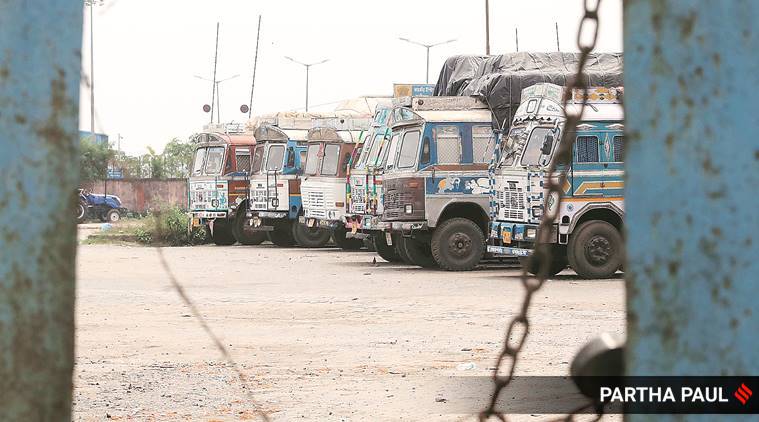Click here to join Express Pune WhatsApp channel and get a curated list of our stories
Industries directorate prepares post-lockdown opening schedule, isolated rural industries to be prioritised
Agri-related industries, healthcare, e-commerce and movement of cargo are some of the sectors that can be restarted, provided social distancing norms are followed and masks worn in public throughout.
 Trucks stranded at Petrapole in North 24 Parganas. (Express photo/Partha Paul)
Trucks stranded at Petrapole in North 24 Parganas. (Express photo/Partha Paul)
The state government’s Directorate of Industries and industrial associations are preparing a roadmap to slowstart industries in the Pune region. Sadashiv Survase, joint director (industries), said in the first phase, industries in rural or isolated areas might be permitted to operate with minimal staff.
On Wednesday, the Ministry of Home Affairs issued new guidelines for opening of industries in non-hotspot zones with ample care. Agri-related industries, healthcare, e-commerce and movement of cargo are some of the sectors that can be restarted, provided social distancing norms are followed and masks worn in public throughout.
District Collector Naval Kishore Ram had appointed Survase as the nodal officer to look into the reopening of industries and the norms that need to be followed.
Survase, who is in-charge of Pune division — which consists of the districts of Pune, Satara, Sangli, Kolhpur and Solapur – said priority will be given to industries in non-urban areas. So, industries in Chakan, Talegaon, Rajangon and Kurkumbh in Pune district are expected to reopen.
Units in the industrial area of Pimpri, Chinchwad and Bhosari are expected to wait longer before reopening.
While planning is underway, Survase admits it will be difficult to start industries in silos. The complete revival of the automobile sector, being the biggest industry in the region, will not be possible till all the OEMs start functioning. So, the Tata Motors plant in Chinchwad will stay shut till its vendors in Chakan or other areas do not reopen.
The industries directorate is also working with the associations to finalise the needs of the stimulus required to jumpstart the sector into action.
Some countries, sources said, had already declared packages for their industries amounting to 10-15 per cent of their GDP. The industry sector is expecting a similar package from the central government which will help them get back on track.
Meanwhile, the 454 units in Pune district and 1,149 units in the division from pharmaceutical, healthcare and agriculture sectors that have been functioning since the beginning of the lockdown employ at least 45,728 people, Survase said. “We are now also allowing the ancillary units for these industries. So, packaging and raw materials providers will also be allowed to function,” he said.
Click here to join Express Pune WhatsApp channel and get a curated list of our stories







